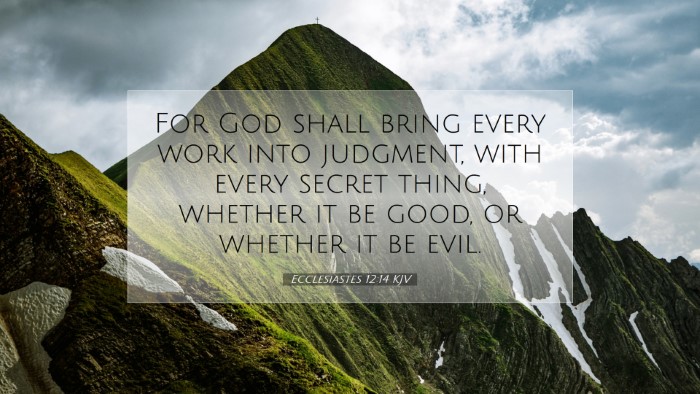Old Testament
Genesis Exodus Leviticus Numbers Deuteronomy Joshua Judges Ruth 1 Samuel 2 Samuel 1 Kings 2 Kings 1 Chronicles 2 Chronicles Ezra Nehemiah Esther Job Psalms Proverbs Ecclesiastes Song of Solomon Isaiah Jeremiah Lamentations Ezekiel Daniel Hosea Joel Amos Obadiah Jonah Micah Nahum Habakkuk Zephaniah Haggai Zechariah MalachiEcclesiastes 12:14
Ecclesiastes 12:14 KJV
For God shall bring every work into judgment, with every secret thing, whether it be good, or whether it be evil.
Ecclesiastes 12:14 Bible Commentary
Bible Commentary on Ecclesiastes 12:14
Verse: "For God shall bring every work into judgment, with every secret thing, whether it be good, or whether it be evil." (Ecclesiastes 12:14)
Introduction
The concluding verses of Ecclesiastes encapsulate the essence of Solomon's reflections on life, wisdom, and the inevitable judgment of God. Ecclesiastes 12:14 serves as a powerful reminder of divine accountability, which resonates deeply with the themes of morality and human action present throughout the book.
The Significance of Divine Judgment
Matthew Henry asserts that the principal theme of this verse is the certainty of judgment. He emphasizes that all human actions, whether public or private, will be evaluated by the Almighty. According to Henry, no deed escapes God’s notice. This principle serves both as a source of comfort and a call to moral vigilance for believers.
Albert Barnes elucidates this by highlighting that "every work" encompasses not only public deeds but also the "secret thing" — those actions concealed from the eyes of others. This underlines a crucial aspect of God’s omniscience, suggesting that human standards for judgment are insufficient compared to God's all-seeing nature.
Exploring 'Every Secret Thing'
Adam Clarke emphasizes the word "secret," interpreting it as an acknowledgment of the hidden aspects of human nature. He notes that while society might overlook certain sins or unjust actions, nothing can be hidden from God. This deeply personal implication of divine judgment urges both introspection and honest living, encouraging believers to align their private conduct with their public profession of faith.
Moreover, Clarke suggests that the judgment mentioned extends beyond mere actions to encompass thoughts, intentions, and motivations, suggesting a holistic view of accountability before God.
The Nature of Good and Evil
Within the verse, Solomon distinguishes between "good" and "evil," a dichotomy that reflects the moral order established by God. Henry comments on this moral framework, stating that all actions ultimately fall into these two categories and that believers are called to act in ways that align with divine goodness.
Barnes further elaborates that understanding what is "good" and "evil" is paramount for believers. He posits that adherence to God's commandments and aligning one's life with His will is essential in light of the impending judgment. This moral clarity is foundational for both personal spirituality and communal ethics.
Encouragement for Righteous Living
Ecclesiastes 12:14 not only warns of future judgment but also serves as a catalyst for righteous living. Clarke suggests that the awareness of this divine scrutiny encourages a life of integrity. The implications of this verse implore believers to pursue honest and righteous actions, knowing they are ultimately accountable to a just and sovereign God.
This call becomes a motivational force for pastors and teachers who bear the responsibility of guiding their congregations toward lives that honor God. Living with the awareness of God’s judgment cultivates a deeper sense of purpose and responsibility in believers’ lives.
Conclusion
In summary, Ecclesiastes 12:14 serves as a profound conclusion to the reflections shared throughout the book. The reminder that God will bring every work into judgment calls for vigilance, introspection, and adherence to moral principles. The insights offered by Matthew Henry, Albert Barnes, and Adam Clarke reveal the depth of meaning contained within this singular verse. Believers are encouraged to live with an eternal perspective in mind, fostering a transformative understanding of their actions and the ultimate accountability before God.


